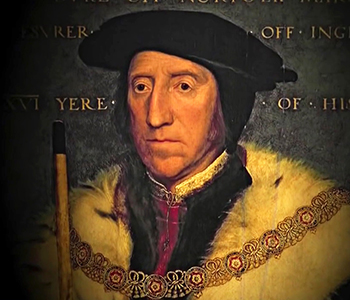
b. c.1485; d. 28 July 1540.
Lord privy seal and principal adviser to Henry VIII who helped to establish the Reformation in the Church of England.

Little is known about Cromwell's early life; most sources trace him to a merchant family in Putney, London. He began his career as a solititor to Cardinal Thomas Wosley. When the cardinal lost his post due to his failure to secure Rome's permission for Henry VIII to anull his marriage to Catherine of Aragon, Cromwell became the lord privy seal. Advising the King that the way to break the impasse over his difficulty with Rome was to assert the autonomy of the King in all matters concerning his nation, including matters of religion, Cromwell—with the help especially of Thomas Cranmer—effected the Act of Supremacy, which made the King the "Supreme Head of the Church of the Church of England," enabled the King to divorce his wife and marry Anne Boleyn, as well as enrich the royal coffer with the dissolution of the monastic orders and confiscation of their very substantial properties.
When Anne Boleyn failed to produce a male heir for Henry VIII, Cromwell engineered the King's divorce and helped arrange for his next marriage to Jane Seymour, who died giving birth to the future king, Edward VI in 1536. Hoping to forge an alliance between the Church of England and the European Lutherans, Cromwell arranged for the King to marry Anne of Cleve in 1540. Henry, however, took an instant dislike to Anne of Cleve. She survived Henry's displeasure, but not Cromwell; he was sacked from his post, arrested on 10 June 1540 and, despite his pitiful plea to the king for mercy, was executed in the Tower of London six weeks later.

©ALBERITH
090216lch